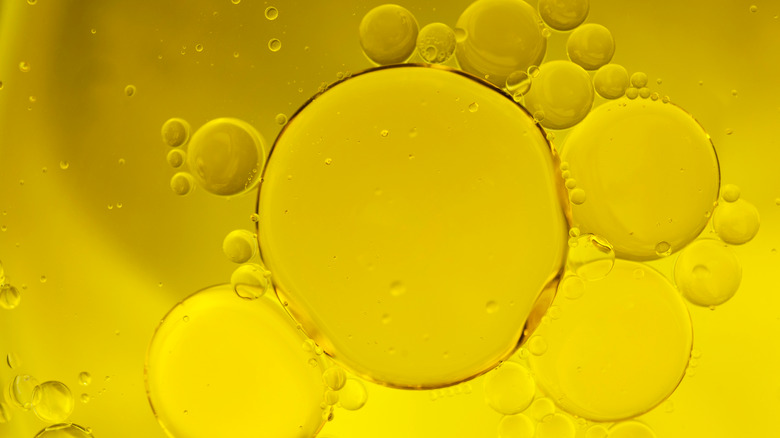This Is What Happens When You Drink Cinnamon Tea Every Day
Warm and sweet in flavor and aroma, cinnamon has been used as a spice for hundreds of years. But it has also been used as an alternative remedy to treat various physical symptoms and conditions, per BMC Complementary Medical Therapies. Over time, scientists have come to understand that what has earned cinnamon its well-deserved health halo is that some of the organic compounds that give cinnamon its essential attributes, including "cinnamaldehyde, cinnamic acid, cinnamate, and numerous other components such as polyphenols" possess antioxidant and anti-inflammatory properties, among other pharmacological benefits, according to a 2014 review published in the journal Evidence Based Complimentary Alternative Medicine.
Cinnamon tea also contains a variety of antioxidants (via Healthline), which are compounds that fight free radicals in your body that can cause oxidation and increase your risk of developing many diseases. Drinking cinnamon tea every day will increase the antioxidants in your body and decrease your risk of developing diabetes, cancer, and heart disease. Other compounds in this tea have been shown to reduce inflammation in the body. Inflammation can lead to a variety of diseases including heart disease, arthritis, and other chronic conditions.
Nevertheless, Healthline points out that in higher doses, one of the compounds in cinnamon, coumarin, may cause a number of deleterious health effects including mouth sores, excessively low blood sugar, cellular damage, and drug interactions. Because a single teaspoon of cassia cinnamon — the more widely available of the two main varieties of cinnamon sold in the U.S. — may exceed the recommended daily tolerability level for coumarin, if you're interested in reaping cinnamon's health benefits, it may be safer to limit the amount you take, per Healthline, by brewing cinnamon tea using a single cinnamon stick (per The People's Pharmacy), as opposed to, say, consuming cinnamon by the spoonful or in pill form. With that in mind, here's what you might expect when you start drinking cinnamon tea every day.
Cinnamon tea can help lower your blood sugar
According to a 2014 meta-analysis published in the Journal of Evidence-Based Complementary Alternative Medicine, cinnamon supplementation can help reduce blood sugar levels and alleviate some of the symptoms of type 2 diabetes and other diseases and conditions that may derive from insulin resistance. Insulin resistance is a dysfunction in the way the body responds to insulin, a hormone manufactured by the pancreas which is critical to the metabolism of sugar, per the Centers for Disease Control and Prevention (CDC). In other words, although the pancreas is making insulin, that insulin is not effective at shepherding blood sugar into the cells where it belongs. Accordingly, blood sugar levels rise, which itself has numerous undesirable consequences, including diabetes and the broader metabolic syndrome.
One of the organic compounds in cinnamon has been found to have a "boosting" effect on insulin in the body, which can help address insulin resistance (per the 2014 meta-analysis). In addition, cinnamon may itself actually mimic the effects of insulin, per Healthline. Whatever the underlying mechanism, the fact is that clinical studies such as this one published in 2009 in the journal Diabetes, Obesity, and Metabolism, and this 2019 study published in the journal Endocrine, suggest cinnamon has the potential to affect a clinically significant decrease in blood sugar. That said, it's best to check with your doctor before you begin a daily cinnamon tea regimen for this particular purpose.
Regularly drinking cinnamon tea can help with weight control
A single serving of cinnamon tea is a rich source of vitamin K, fiber, and manganese, but delivers only two calories, which could make it a handy weight-loss tool, according to Healthy Food Serving. Apart from the satiety support his low-calorie beverage may offer, there is also evidence that cinnamon supplementation helps with weight loss — as much as the prescription drug for weight loss, orlistat, albeit for different reasons, per this 2019 study published in the journal, Endocrine.
In that study, half of the test subjects were given orlistat twice daily for 30 days and then once daily for 30 days. The other half received cinnamon supplementation for the entire 60 days. Blood tests were taken at the outset and after the completion of the study period. A comparison of the results suggests that whereas orlistat helped those who took it to lose weight by stabilizing blood sugar and decreasing appetite, cinnamon helped those who took it to lose weight by reducing both serum insulin level and insulin resistance (higher levels of insulin in the blood are associated with weight gain, according to Mayo Clinic, and so is insulin resistance, according to Cleveland Clinic). What isn't entirely clear from the study, however, is whether the strength of the cinnamon supplements exceeded the strength of a cup of cinnamon tea, and as Healthline points out, at higher dosages, cinnamon can be harmful.
Drinking cinnamon tea may help you fight off E. coli and other foodborne bacteria
In 1999, a scientific study published in Institute Of Food Technologists (via Science Daily) demonstrated that cinnamon tea may be highly effective at neutralizing the potentially deadly E. coli O157:H7 bacteria. Cinnamon was combined with apple juice contaminated with a high level of E. coli — more than 100 times the number of bacteria usually found in E. coli-tainted food. What the researchers found was that the cinnamon in the contaminated apple juice killed more than 99% of the bacteria within three days at room temperature.
"If cinnamon can knock out E. coli O157:H7, one of the most virulent foodborne microorganisms that exists today, it will certainly have antimicrobial effects on other common foodborne bacteria, such as Salmonella and Campylobacter," suggested lead researcher, Daniel Y.C. Fung, professor of Food Science in the Department of Animal Sciences and Industry at Kansas State University. Moreover, that it as suspended in a liquid made it more effective as an antibacterial agent than when sprinkled on meat, as had been done in a previous study. "In liquid, the E. coli have nowhere to hide," Fung noted.
It's worth noting here that these studies were conducted "in vitro" as opposed to "in vivo" — in part because it would be challenging from an ethical perspective to feed a human E. coli-tainted foods or beverages. However, these studies suggest that cinnamon may come to be used clinically to neutralize threatening bacteria in the human digestive tract.
Cinnamon tea could specifically suppress the bacteria associated with peptic ulcer
Peptic ulcer disease refers to open sores in the stomach or the first part of the small intestine, per the Cleveland Clinic. The most common cause of peptic ulcer disease is the bacteria Helicobacter pylori (aka H. pylori), via Cleveland Clinic. The overgrowth of H. pylori is also associated with chronic gastritis, inflammatory bowel disease, and, rarely, cancers of the stomach. Since cinnamon has been proven effective against a number of bacterial infections, scientists have been inspired to investigate whether cinnamon supplementation may be used to treat H. pylori, particularly in light of the fact that increased antibiotic resistance has made it increasingly difficult to treat this particular bacteria.
As it turns out, cinnamon consumption may safely help inhibit the growth of H. pylori with little or no adverse reactions and without adding to the problem of antibiotic resistance, per this 2015 study published in the Journal of Traditional and Complementary Medicine. However, cinnamon tea may help even if your stomach upset is not caused by H. pylori. According to a 2006 study published in the Siriraj Medical Journal, a "stomachache remedy" made with cinnamon was demonstrated to be as effective as the anti-dyspepsia medication simethicone in treating indigestion. In other words, drinking cinnamon tea may provide stomach relief in a few ways, both by treating the symptoms of ordinary indigestion, and in helping to kill off the bacteria most often responsible for causing peptic ulcer disease.
Drinking cinnamon tea can help treat COVID-19
Cinnamon possesses not only antibacterial properties, but also antifungal properties (via Healthline) and anti-viral properties, according to Touro University. Now, a 2021 meta-analysis published in the journal Biomedicine & Pharmacotherapy suggests that cinnamon may be useful as a treatment for COVID-19 and some of its symptoms and related complaints, in part because of its "anti-obstructive/opener effect." This is not only a benefit in and of itself, but it also means that the use of cinnamon as a COVID-19 treatment has the potential to reduce the need for COVID-19 treatment protocols that require chemical manufacture.
Another 2021 meta-analysis published in Identification of Biomarkers, New Treatments, and Vaccines for COVID-19, offers a review of the "possible mechanisms of cinnamon on the inflammatory cascade" that has been associated with severe COVID-19 cases and mortality. Specifically, the analysis discusses how some of cinnamon's component compounds, including cinnamaldehyde and cinnamic acid, could be used as a "potential alternative therapy to decrease oxidative stress and inflammation in COVID-19 patients."
In both cases, the research is still at a theoretical and academic level. Extensive clinical study to confirm and form definitive recommendations will, therefore, be needed before recommendations can be made about whether tea is the ideal medium for COVID-19 treatment purposes. Be sure to consult with your doctor before adding anything, including cinnamon, to your treatment regimen.
Drinking cinnamon tea could help be helpful in preventing cancer
One of the ways the human body was designed to prevent cancer is through apoptosis, according to the National Human Genome Institute, which defines it as the mechanism by which routine cell death is occurs throughout our lives as a matter of course. Apoptosis is critical, first, in fetal development, in that it eliminates cells that might otherwise produce various malformations such as webbing between the fingers or even an extra fingers. In adulthood, apoptosis is crucial to help the body discard potentially harmful cells — such as cancer cells — before they can accumulate. Accordingly, when apoptosis is interrupted or overwhelmed by the rapid proliferation of harmful cells, negative consequences may result, including cancer.
According to a 2019 academic paper published in the European Journal of Medicinal Chemistry, cinnamon possesses anticarcinogenic properties due to its promotion of apoptosis. Therefore, cinnamon may someday be used as an anti-cancer treatment modality that targets pathological cells and causes them to self destruct before they can become a diagnosable cancer. Much more research is needed, however, to determine safety and efficacy of using cinnamon for this purpose, as well as to identify the optimal method for delivering cinnamon's antioxidant and anti-inflammatory properties to damaged cells. But for now, know that the cinnamon in your tea may be fighting cancerous cells in your body.
Cinnamon tea may help alleviate some PMS symptoms
Premenstrual syndrome, or PMS, is a condition affecting 75% of menstruating women (via Mayo Clinic). PMS symptoms include water retention, tender breasts, fatigue, sleep problems, and food cravings, and it's also associated with mood swings, depression, and anxiety. PMS would appear to be largely hormonally driven, according to Fairview, which points out that it coincides with low levels of estrogen, which may, in turn, cause levels of the feel-good hormone serotonin to drop as well. In addition, a relative rise in progesterone levels immediately preceding the start of menstrual bleeding (which marks the first day of the menstrual cycle and the technical end of the premenstrual period) may also be to blame.
Although the research is preliminary, some studies such as this one from 2017, which was published in the Iranian Journal of Basic Medical Sciences, suggest that cinnamon supplementation may be useful in counteracting some of the affective symptoms associated with PMS. However, this particular study was conducted in mice, so there's quite a ways to go before cinnamon could be used to alleviate human PMS, if it does turn out to be a useful therapy. A 2020 study published in the Macedonian Journal of Medical scientists, which used rats as subjects, would appear to concur in supporting the hypothesis that cinnamon may discourage depression by increasing serotonin levels — and this could prove helpful in boosting lowered serotonin levels that contribute to PMS.
Cinnamon tea has been shown to effectively improve painful menstrual periods
PMS symptoms give way to some relief upon the start of monthly bleeding, but in many women, that relief is short-lived as dysmenorrhea sets in. This very common condition, which is characterized by painful period cramping that is often associated with related physical complaints such as gastrointestinal distress, nausea, and vomiting, is caused by uterine contractions, according to this 2015 study published in the Iranian Red Crescent Medical Journal. Although that study was small, it suggests that cinnamon supplementation may "significantly reduce pain, the amount of menstrual bleeding, nausea and vomiting in female." At least that's what it did for 38 female college students who were given cinnamon capsules and assessed for dysmenorrhea symptoms. Apparently, in these women cinnamon supplementation had a "significant effect" on diminishing all of these aspects of dysmenorrhea, whereas the 38 in the placebo group did not enjoy such benefits.
In this study, the cinnamon was given by capsule — each containing 420 mg of cinnamon. However, similar results were obtained via 2018 study published in the International Journal of Science and Healthcare Research, in which another relatively small experimental group of female college students was given cinnamon tea. In those women, dysmenorrhea symptoms were diminished at clinically significant levels. Concluding that cinnamon tea is effective at reducing dysmenorrhea symptoms, the study also noted that turmeric water is equally effective.
Cinnamon tea could help you to reduce your blood pressure
High blood pressure (i.e., hypertension) appears to respond well to cinnamon supplementation according to various studies, as analyzed and reviewed in a 2017 academic paper published in the Journal of Renal Injury Prevention. How is it that ingesting cinnamon can lower blood pressure? Well, Healthline notes that cinnamon has the effect of both dilating and relaxing blood vessels, and these contribute to lower blood pressure.
A 2020 meta-analysis published in Critical Reviews In Food Science and Nutrition went even further than the 2017 paper in summarizing all the scientific findings regarding how cinnamon affects blood pressure. The authors of this analysis observed that "cinnamon supplementation resulted in significant reduction" in both blood pressure metrics — i.e., systolic blood pressure and diastolic blood pressure. Some other scientific studies, including this one published in 2015 in the Diabetology Journal, indicate this reduction was also observable in people with type 2 diabetes.
Cinnamon tea could be helpful in lowering bad cholesterol levels
Since high blood pressure is often associated with the existence of fatty buildup in blood vessels, optimizing one's blood lipid profile may help reduce high blood pressure. Cinnamon supplementation has been shown to reduce bad cholesterol as well as triglycerides in the blood of people with type 2 diabetes, per a 2015 study published in Diabetology International. For that study, 49 people with type 2 diabetes were given cinnamon supplementation in the form of cinnamon capsules for a period of 60 days, and 50 people were given a placebo capsule over the same time period. At the end of the study period, good cholesterol (HDL), bad cholesterol (LDL), and triglycerides (a type of fat found in the blood, and high levels of which are associated with increased stroke risk, per Mayo Clinic) levels in the subjects were compared with their baseline levels. What the researchers found is that all measures of metabolic dysfunction were significantly improved in the people given cinnamon supplementation, including LDL levels (which tended to decrease), HDL levels (which tended to increase), and triglyceride levels (which tended to decrease).
Accordingly, the researchers concluded that cinnamon supplementation may help people with type 2 diabetes to avoid diabetic complications, including a diagnosis of metabolic syndrome. On the other hand a January 2022 review published in the American Journal of Medicine raises doubts regarding cinnamon's ability to decrease LDL and triglyceride levels. Accordingly, more research is needed in this area.
Drinking cinnamon tea may support optimal kidney function
Chronically high levels of blood sugar can damage the blood vessels of the kidneys over time, which can itself impair kidney function, according to the National Institutes of Diabetes and Digestive and Kidney Diseases. In addition, high blood pressure can do damage to the kidneys. Since cinnamon supplementation may help stabilize blood sugar and lower blood pressure, as per this 2014 review of studies on cinnamon supplementation that was published in the journal Evidence Based Complimentary Alternative Medicine, it stands to reason that cinnamon supplementation might help to improve kidney function. In fact, a 2016 study published in the journal Diabetology International specifically demonstrated the promise of this particular hypothesis.
In that study, kidney function was measured via creatinine clearance and glomerular filtration rate, both of which were assessed in the 99 study subjects via blood testing at the beginning and end of the 60-day study period. In the 49 subjects who were given cinnamon supplementation as opposed to a placebo, glomerular filtration rates significantly improved, as did creatinine clearance, both of which findings suggest that cinnamon supplementation can help improve kidney function. However, it's best not to embark on a daily cinnamon tea regimen for the purpose of supporting kidney function without first checking with your healthcare provider, particularly if you are taking insulin or other medications.
Drinking cinnamon tea could help to prevent neurodegenerative disease
Although there hasn't yet been a ton of scientific research on the safety and efficacy of cinnamon supplementation in humans for the purpose of preventing neurodegenerative diseases such as Alzheimer's and Parkinson's, some studies suggest, nevertheless, that the possibility is worth digging into, per Healthline. One such study, which was published in 2018 in the journal Pharmacological Research, was a meta-analysis of existing research on cinnamon's anti-inflammatory and antioxidative effects on the brain. What the researchers discovered is that cinnamon may, indeed, offer some degree of protection against Alzheimer's disease and its progression. Likewise, a 2014 study published in the Journal of Neuroimmune Pharmacology demonstrated that cinnamon supplementation helped improve motor function in mice in whom Parkinson's symptoms were induced chemically.
Randomized, controlled clinical studies involving humans will be needed to confirm these possible connections. And there may be one key problem: As the Alzheimer's Society points out, "the levels of cinnamon a person would have to eat to replicate the results of many of the experiments that have taken place would actually be toxic." Nevertheless, drinking cinnamon tea in moderation should not present a risk of toxicity, and it may turn out that this practice has neurological/cognitive benefits.
What you need to know about the risk associated with drinking cinnamon tea
While cinnamon boasts numerous health benefits, it can also be harmful when consumed in large doses, per Healthline. For one thing, all cinnamon contains the organic compound coumarin (although coumarin levels are higher in cassia cinnamon). Taken in larger doses over time, coumarin can harm the liver, according to the National Center for Complimentary and Integrative Health (NCCIH). Excessive consumption of coumarin may also increase the risk of certain cancers. Accordingly, it's safer to enjoy cinnamon supplementation in the form of a single daily cup of cinnamon tea (preferably made by steeping a single cinnamon stick in hot water, per The People's Pharmacy), notwithstanding that some of the studies mentioned herein involved cinnamon supplementation in pill form.
That said, drinking cinnamon tea may present other issues. First, cinnamon consumption can induce an allergic reaction (primarily in the form of skin and mucus membrane irritation) in some people, according to a 2015 study published in the Journal of Traditional and Complementary Medicine. In those taking insulin for high blood sugar, cinnamon tea could cause blood sugar to drop too low (via Healthline). Cinnamon may also interact with some medications prescribed for heart and/or liver disease, as well as with acetaminophen. Further, if you're pregnant or breastfeeding, it would be best to check with your healthcare provider before starting on a daily cinnamon tea regimen, per NCCIH.














